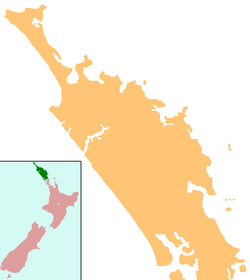Maungakaramea
Maungakaramea | |
|---|---|
 Maungakaramea | |
| Coordinates: 35°50′38″S 174°12′15″E / 35.84389°S 174.20417°ECoordinates: 35°50′38″S 174°12′15″E / 35.84389°S 174.20417°E | |
| Country | New Zealand |
| Region | Northland Region |
| District | Whangarei District |
Maungakaramea is a locality in Northland, New Zealand. Whangarei is to the northeast.[1][2]
Local features include Tangihua Forest, Maungakaramea Sports Club and Mid Western Rugby Club.
History and culture[]
The name Maungakaramea was given to the area by local Māori. There are two interpretations of the meaning of the name, one is that "Karamea" means speargrass (Aciphylla[3]), hence the "speargrass mountain", the other is that Karamea is a coloured clay of a reddish type used for war paint on the face and body. A safe interpretation is "Red Ochre Mountain".[4]
The area from Whangarei to Waipu, Waihonga and Tangihua, was taken from Ngaitahuhu by a Ngapuhi chief, Te Ponaharakeke, who joined with Te Ngarokiteuru to drive all the Ngaitahuhu out in the mid-18th century.
The first record of a European settler in the Maungakaramea area was in 1820 when the Reverend Samuel Marsden encountered a Māori tribe whilst travelling overland via the Kaipara Harbour.
The Maungakaramea blocks were purchased by the government in 1855.
The Eastern part of the Maungakaramea Block (now part of Mangapai) was opened for sale in April 1857, but the area now considered Maungakaramea was not open to selection until May 1859.
Amongst the early settlers were two brothers, Henry Spear Wilson and Daniel Cook Wilson.[5] Also, Jonathan Wigmore Sherlock and his wife Ann arrived in 1859 from Ireland, and took out land orders for 78 acres, being Lots 59 and 60, on 2 May 1859 – the first day this area was open for selection.[6]
The local Maungārongo Marae and meeting house are a traditional meeting place for the Ngāpuhi hapū of Ngāti Hine, Ngāti Te Rino, Te Parawhau and Te Uriroroi.[7][8]
Education[]
Maungakaramea School is a coeducational full primary (years 1-8) school with a roll of 90 students as of November 2021.[9][10] The school celebrated its 125th reunion in 2000.[11]
Notes[]
- ^ Peter Dowling (editor) (2004). Reed New Zealand Atlas. Reed Books. pp. map 7. ISBN 0-7900-0952-8.CS1 maint: extra text: authors list (link)
- ^ Roger Smith, GeographX (2005). The Geographic Atlas of New Zealand. Robbie Burton. pp. map 27. ISBN 1-877333-20-4.
- ^ "Karamea". Te Aka Online Māori Dictionary. Retrieved 8 September 2019.
- ^ "1000 Māori place names". New Zealand Ministry for Culture and Heritage. 6 August 2019.
- ^ Pickmere, Nancy Preece (1986). Whangarei: The Founding Years. p. 66.
- ^ "The Sherlocks of Ireland and Wales," Arian Collins, 2011.
- ^ "Te Kāhui Māngai directory". tkm.govt.nz. Te Puni Kōkiri.
- ^ "Māori Maps". maorimaps.com. Te Potiki National Trust.
- ^ "New Zealand Schools Directory". New Zealand Ministry of Education. Retrieved 22 December 2021.
- ^ Education Counts: Maungakaramea School
- ^ "Maungakaramea School". Education Gazette New Zealand. 79 (5). 20 March 2000.[dead link]
- Whangarei District
- Populated places in the Northland Region
